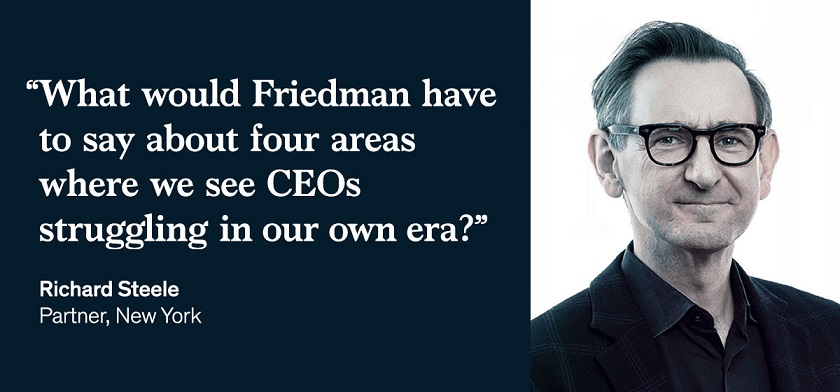
Should business have a “social conscience”? A look back at the essay that got tongues wagging
Milton Friedman’s 1970 essay on corporate social responsibility still resonates, so we asked a McKinsey partner to place the piece in today’s context. Plus, keeping innovative treatments for severe diseases on track during the pandemic, and how companies can make meaningful progress for LGBTQ+ employees.
This week marks the 50th anniversary of Milton Friedman’s seminal essay on corporate purpose, “The social responsibility of business is to increase its profits,” published in the New York Times Magazine.
Friedman, of course, famously and stridently disagreed with those who believed that business should have a “social conscience,” asserting that they were part of a force that was “undermining the basis of a free society.”
The article and its lasting influence on shareholder capitalism have been topics of much discussion, including in the New York Times Magazine, in the Financial Times, and in McKinsey’s own look at how the conversation about corporate purpose has shifted over the past 50 years.
The Shortlist reached out to Richard Steele, a partner in our Organization Practice who works across the business and social sectors and co-leads our Organizing for the Future initiative, about the article’s legacy for today’s CEOs. Here’s what he told us:
Few articles on economics or business have had such a profound impact as Friedman’s. I believe there are two reasons for that: the content of his argument and the context in which he made it.
At the risk of oversimplifying, the content was meant to highlight the “principal-agent problem” and to demonstrate the many ways corporate managers must serve the interests of the owners of the company rather than their own values or interests. This is an argument about the fundamental importance of property rights, which extends naturally to belief in the power of market forces and then to the relationship between business and government itself.
The context, again at the risk of oversimplifying, was that the US was locked in a technological and ideological race with the Soviet Union, and there was genuine fear that, despite putting a man on the moon, the US was losing. Large, diversified corporations risked misallocating capital, unions wielded significant power, and economic growth was beginning to slow, a trend soon accelerated by the oil shock and runaway inflation.
In what we now call the social sector, the Peterson Commission had just recommended new approaches to the governance of foundations to require them to disburse a minimum percentage of funds. Again, the motivation was to ensure that the management of charitable entities served the interests of beneficiaries, not themselves.
In this context, Friedman’s article identified a clear problem—unaccountable corporate managers making decisions based on their values, not on shareholder value. He also laid out an appealing antidote—the demand that they focus on directly improving the performance of their company.
Rather than critique the article as published in 1970, I’d invite readers to engage in a thought experiment about what would be an era-defining article that, written today, would be worth reviewing in 50 years.
Put another way, how might Friedman change or add content to the article given the profound shifts in context from 1970 to today’s business environment, without losing the principles of property rights and the power of market forces? Here are four shifts that we see CEOs struggling with day to day that I wish the article could provide insights on.
- We are in an era of massive technological change that requires CEOs to make ever-more complex judgments to manage the value of their companies. Now the vast majority of the value of any company is based on cash flows that will be generated beyond the average tenure of a CEO. I’d love to know how Friedman would advise CEOs to invest for long-term results under conditions of uncertainty. For instance, would he be for or against pharmaceutical companies investing in a COVID-19 vaccine? How would he recommend they price and distribute the vaccine?
- Perhaps Friedman would add to his definition of the principal-agent problem to reflect the rise of different forms of shareholders, from hedge funds trading on algorithms to ESG investors. How would Friedman suggest a CEO respond to the legitimate rights of owners when their interests and reasons for investing in a company are often so divergent, or when they are expressed by institutional shareholders only looking for consistent quarterly earnings growth—a poor proxy for long-term value?
- Next, economics, decision science, and decentralization of knowledge have all evolved. Behavioral economics now informs our understanding of biases in decision making. These biases affect not just corporate managers but also the humans who, as board members, are meant to represent the long-term interest of the company. We know the best way of challenging these biasesis to ensure a diversity of opinion in decision making. So how would Friedman define the ideal board to ensure managers stick to their roles as agents and play their roles well? Should employees who own shares be included to add diversity of thought, and, if so, what about employees who don’t own shares but have spent 30 years toiling for the company and who feel ownership and want to use their voice?
- Finally, the way Friedman closes his argument raises a key point about today’s business environment: “There is one and only one social responsibility of business—to use its resources and engage in activities designed to increase its profits so long as it stays within the rules of the game[emphasis added], which is to say, engages in open and free competition without deception fraud.” This is a time when the rules aren’t clear, and many feel they need to be remade. The inflation of healthcare and education costs have locked many people out of the American dream. Externalities like the environment, which was an abstract long-term question in 1970, are now pressing because of climate change, and license-to-operate issues are threatening value in many industries, not just in the energy sector. Many citizens see that corporations can maximize their value by engaging in lobbying and politics in a way that secures the rents of incumbents at the expense of innovation and the loss of belief in democracy. How would Friedman advise CEOs to act when the rules of the game need to be remade and/or can be remade in their industry’s favor at little expense?
What these four shifts have in common is that they invite, enable, and perhaps require CEOs to engage with and learn from diverse participants who have a legitimate interest in the company not limited to equity ownership. They must strive to be the best agent while addressing problems of staggering complexity where there is no best practice or the kind of perfect information that Friedmanites often assume exists. The question is how to behave and how to construct a system in which leaders can make better decisions for the health of the company.
My hope is that we can move beyond Friedman’s position that the alternative to his proposed role of business was “socialism” to create a model of stakeholder engagement in decision making that fits our complex times and gives CEOs more support, information, and tools to manage their enterprise’s long-term value.





